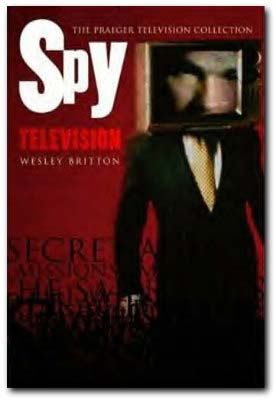| |
Wesley Britton’s Books, Interviews,
and Media Appearances ~
Spy Television
By Wesley Britton
Praeger Publishers ~
January 30, 2004
Format ~ Hard-bound
Pages ~ 312, including photos
ISBN ~ 0-275-98163-0
Spy Television is the first full-length overview of
every TV spy show broadcast from 1951 to the present. Fans of
series such as The Man from U.N.C.L.E., The
Avengers, Get Smart, The Wild Wild
West, The Prisoner, The Saint,
I Spy, The X-Files, La Femme
Nikita, Alias and 24 will find
information and insights to please the most die-hard expert as well
as casual viewers.
Lovers of short-lived and almost forgotten series like VR5,
I Led Three Lives, The Protectors, The
Sandbaggers and The A-Team will learn how these
shows came to be and why they disappeared. Friends of
MacGyver, The Equalizer, and even
Wonder Woman will learn how Hollywood saw their series
as more than prime time entertainment – spy shows tell us
much about how Hollywood thinks we think.
From cover to cover, Spy Television is more than
behind-the-scenes information, production histories, and revelations
from casts and producers. Extensively researched, Spy
Television explains the contexts in which spy shows were
created, explores the influence of spy TV on our culture, and points
to unexpected connections between actual espionage and our feelings
about undercover operatives, past and present.
Spy Television is a book for experts, fans, and students
of TV, popular culture, the history of the Cold War, and what’s
really going on in shadowy government agencies. Fans of science-fiction
and detective shows will find surprising connections between their
favorite shows and the secret worlds of secret agents.
And 007 enthusiasts will find pages and pages showing how the
world’s most famous secret agent was part of TV history from
the 1950s to the present.
Spy Television is for school and public libraries as well
as the bookshelves of aficionados of every aspect of the genre, from
the influence of old-time radio to the impact of 9/11.
What’s in Spy Television?
Acknowledgements
Introduction
Chapter 1 – Defining a Genre
Chapter 2 – The Roots of a Family Tree: 1900 to 1961
Chapter 3 – Bond, Beatles, and Camp: The Men from
U.N.C.L.E.
Chapter 4 – More British Than Bond: John Steed,
The Avengers, and Feminist Role-Playing
Chapter 5 – Cold War Sports and Games: I Spy
and Racial Politics
Chapter 6 – The Cold War and Existential Fables:
Danger Man, Secret Agent, and The
Prisoner
Chapter 7 – The Page and the Screen: The Saint
and Robin Hood Spies
Chapter 8 – Interchangeable Parts: Mission:
Impossible
Chapter 9 – James Bond on the Prairie: From The
Wild Wild West to The Secret Adventures of Jules
Verne
Chapter 10 – From Tongues in Cheek to Tongues
Sticking Out: Get Smart and the Spoofing of a Genre
Chapter 11 – Also-Rans and New Branches: Network
Secret Agents from 1963 to 1980
Chapter 12 – Reagan, Le Carré, Clancy,
Cynicism, and Cable: Down to Earth in the 1980s and 1990s
Chapter 13 – The Return of Fantasy and the Dark Nights
of Spies: The X-Files, La Femme Nikita, and
the New Millennium
Chapter 14 – Active and Inactive Files: Alias,
24, The Agency and Twenty-First-Century Spies
Conclusion – The Past, Present, and Future of TV Espionage:
Why Spies?
Notes
References
Index
Photo Essay follows page 123
Endorsements from the Experts ~
Jon Heitland, author of The Man from U.N.C.L.E. Book: The
Behind the Scenes Story of a Television Classic ~
Britton has conducted an exhaustive analysis of a unique time in
our cultural history – the spy craze of the 1960s and its
subsequent ripple effects over the years. He’s left no stone
unturned in digging up not only the classic entries in this genre, but
also the obscure, the forgotten, and the one-season wonders. I
thought I knew every entry in this genre, but his book reminded me of
many I'd forgotten, and informed me on many I had missed completely.
This book is the definitive history of the spy phenomenon that was a
cultural outgrowth of the Cold War.
Danny Biederman, writer/director of the James Bond featurette
A Spy for All Seasons; author, The Best of Bond . . .
James Bond (EMI Publishing); author, The James Bond
Collection (Warner Bros. Publishing); screenwriter, The
Avengers: The Journey Back, Gavilan (MGM) ~
Wesley Britton has his finger squarely on the pulse of the TV spy.
A wonderfully comprehensive examination of the numerous spies who
have passed through our living rooms over the decades, Britton’s
Spy Television covers the espionage gamut from
Avengers to Wild Wild West. A must-have for
anyone interested in the history of this all-important TV genre.
Reviews ~
Midwest Book Review (MBR): Internet Bookwatch,
“Reviewer’s Choice” – October 2004 ~
Two excellent titles deserve ongoing recommendation as excellent
college-level references for specialty libraries . . . Wesley Britton’s
Spy Television (0275981630, $39.95) is the latest addition
to “The Praeger Television Series” and deserves ongoing
mention as a powerful contribution not only to Praeger’s television
collection, but to television analysis as a whole. For half a century,
television spies have been trained pros and businessmen alike who have
featured the spy lifestyle in television sitcoms and presentations. Spy
Television considers the history of spy shows on the screen,
why they succeeded or failed, and how fact and fiction have been molded
by them. Britton earned his doctorate in literature and has established
himself as a critic and columnist over the years, making him the perfect
choice for an in-depth analysis such as Spy Television
provides.
Midwest Book Review (MBR): Internet Bookwatch,
“Reviewer’s Choice” – September
2004 ~
From the early 1960s, TV spies were presented in light of
anti-Communist propaganda, and through the years this model has
developed to cover murky motives and adventures fraught with
international intribut. Spy Television considers how
both popular and obscure spy shows came to TV, analyzes how
and why the shows either succeeded or failed, and examines how
fact and fiction have been incorporated into the genre. Britton
earned his Ph.D. in American Literature and his penchant for
uncovering sources and roots readily shines.
Library Journal – May 1, 2004 ~
Britton has produced a comprehensive guide to the many
espionage-oriented television series that have aired in the United
States from the 1960s to the present . . . Offers a fascinating
window into an understudied genre. The first entry in a new
series on television, this work is recommended for academic
libraries that support television and popular culture programs and
public libraries.
American Library Association, Choice Reviews Online
– September 2004 ~
Britton has written the Baedeker of spy television films and series,
an encyclopedic history of this popular television genre. . . Public
libraries; comprehensive academic collections supporting coursework
in the history of television.
American Library Association; Booklist Online, “Top 10
Performing Arts Books: 2004”, by Ray Olson – November
1, 2004 ~
The most sidely recognized of all artists are indisputably the performers
of music, plays, and dance. One sign of that recognition is the fact that
every year brings several very good new books about them, such as
the following 10 starred review titles from the last 12 months’
worth of Booklists. And don’t cry foul about the books on
choreographers, for, rising from the ranks of fellow dancers, they are
among the most strenuous performers of all . . .
Britton, Wesley – Spy Television. 2004.
Greenwood/Praeger, $39.95 (0-275-98163-0). Britton packs as much
as possible into this in-depth exploration of spy shows, from The
Man from U.N.C.L.E., Mission: Impossible, I
Spy, Get Smart, The Avengers, and
The Prisoner to Alias, 24, and,
hey, even Britain’s terrfic The Sandbaggers.
Booklist Online – April 1, 2004 – starred
review ~
Here, for all television addicts, is a much-needed, long-overdue, in-depth
exploration of one of the medium’s more enduring genres: spy
TV. Britton begins before the beginning, with radio and movie serials
depiciting spies, but moves on quickly to early spy television in the 1950s
and then to the show that brought the genre into the mainstream,
The Man from U.N.C.L.E., which debuted in 1964. From
there, the hits just keep coming, from Mission: Impossible,
I Spy, Wild Wild West, Get Smart,
and The Avengers to the new millennium with Alias
and 24.
All of these classic series are discussed in considerable detail, but
what makes the book such a resounding success for fans of the genre
is the coverage of the forgotten show or the curious fact, stuff other
books miss but devotees love. For example, until now, readers could
look in vain for any substantive discussion of the terrific British series
The Sandbaggers; similarly, no discussion of the genre
would be complete without a mention of Patrick McGoohan’s
late-sixties series The Prisoner, but how many other writers
take the trouble to point out that, nearly a decade after the show left
the air, McGoohan did a riff on his character in an episode of
PrisonerColumbo?
It is Britton’s broad knowledge, and his commitment to
packing as much detail as possible into his book, that makes this an
indispensable addition to any television buff’s reference shelf.
If you love spy TV, this book is, well . . . thrilling.
How to Get Spy Television ~
Spy Television is available in bookstores everywhere,
as well as these online merchants. To go to the order page, just click
on the link.
Amazon – United States
Amazon – Canada
Amazon – United Kingdom
Barnes & Noble
Powell’s Books
|
|

